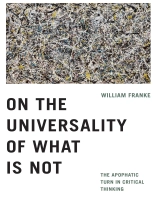Branching out from his earlier works providing a history and a theory of apophatic thinking, William Franke’s newest book pursues applications across a variety of communicative media, historical periods, geographical regions, and academic disciplines—moving from the literary humanities and cultural theory and politics to more empirical fields such as historical anthropology, evolutionary biology, and cognitive science. On the Universality of What Is Not: The Apophatic Turn in Critical Thinking is an original philosophical reflection that shows how intransigent deadlocks debated in each of these arenas can be broken through thanks to the uncanny insights of apophatic vision. Leveraging Franke’s distinctive method of philosophical, religious, and literary thinking and practice, On the Universality of What Is Not proposes a radically unsettling approach to answering (or suspending) perennial questions of philosophy and religion, as well as to dealing with some of our most pressing dilemmas at present at the university and in the socio-political sphere. In a style of exposition that is as lucid as it is poetic, deep-rooted tensions between alterity and equality in all these areas are exposed and transcended.
लेखक के बारे में
William Franke is professor of comparative literature and religious studies at Vanderbilt University and past professor of philosophy and religions at the University of Macao (2013–16). He is a research fellow of the Alexander von Humboldt-Stiftung and has been Fulbright-University of Salzburg Distinguished Chair in Intercultural Theology and Study of Religions. He is the author of A Philosophy of the Unsayable (University of Notre Dame Press, 2014).












